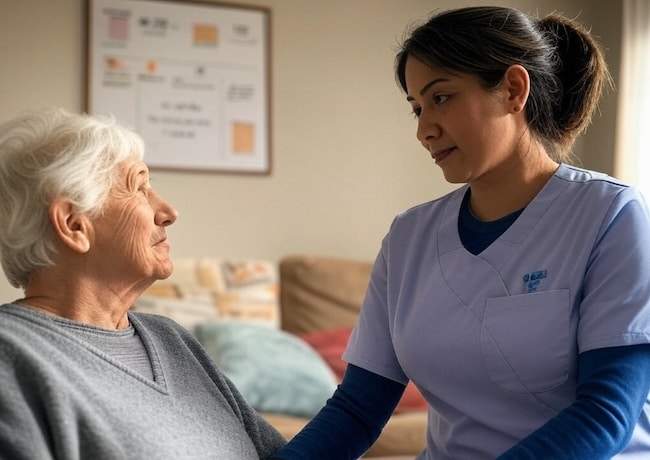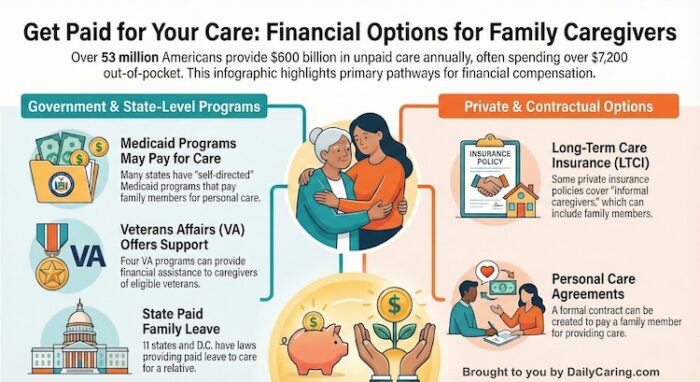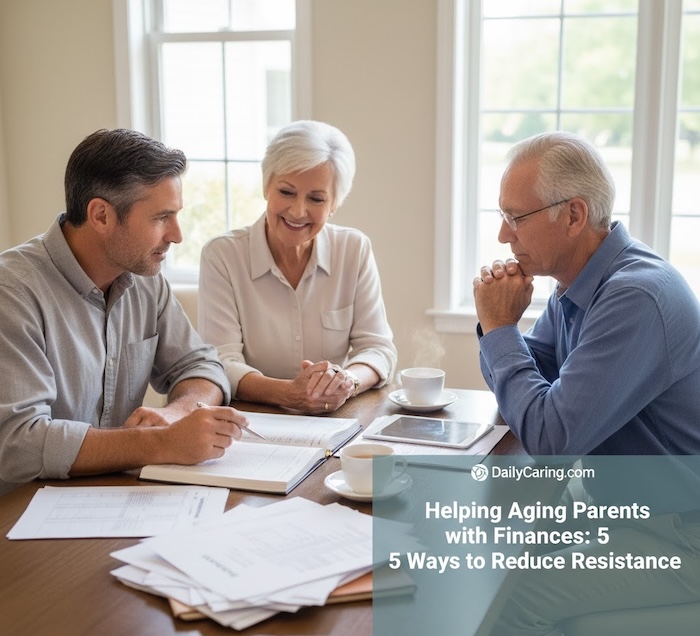You dedicate your time, energy, and heart to caring for your aging parent, often putting your own life and finances on hold. But what if you could get paid for the invaluable care you provide? It’s not a fantasy; it’s a reality for many families through underutilized government programs.
Navigating the world of caregiver compensation can feel overwhelming, but you've already done the most challenging part: showing up. Now, let us guide you through three key government benefit programs that can help ease your financial burden and honor the essential work you do every single day.

Some Benefits Programs Pay Families to Care For Seniors
Out-of-pocket costs for caregivers can include medical supplies, prescription drug co-pays, home modifications, home care help, and more.
In addition, many people have had to leave their jobs or cut back on hours to care for friends or family.
Any extra money could help ease the financial pressure, so family caregivers often ask, “Can I get paid for caregiving?”
The good news is that getting paid as a family caregiver is possible – these government benefits programs exist.
The not-so-good news is that these programs aren’t available everywhere, and not everyone will qualify. But checking in to see if you can get the benefits is worthwhile.
We explain how they work and where to apply.
VIDEO: How to Get Paid as a Family Caregiver
3 Ways to Get Paid as a Family Caregiver
1. Medicaid Programs
Most states have Medicaid programs that help seniors pay for in-home caregivers.
That person could be a family member or a friend, rather than a professional caregiver. Some states also allow a spouse to be the paid caregiver.
Each state has its own eligibility requirements and program name.
If your older adult is accepted into the state’s program, the money they receive will depend on a Medicaid assessment of need and the average state wage for in-home care aides.
To find the local Medicaid office and learn how to apply for the program, it’s best to start with the local Area Agency on Aging.
Ask them how to contact the local Medicaid office or how to apply for a program that pays you for caring for your older adult.
2. Special State Programs
Some states may have similar programs that pay family caregivers, but for people who are not eligible for Medicaid or who have specific conditions, such as traumatic brain injury.
To find out if there are any special programs that your older adult may qualify for, contact your local Medicaid office or the state department of health.
To find the correct government office, it might be easiest to start with the local Area Agency on Aging and ask them to direct you.
3. Veterans Benefits Programs
Veteran-Directed Home and Community-Based Services (VD-HCBS)
This home-based care program helps veterans of any age who are at risk of institutional placement continue living in their own homes.
Veterans can choose the services that best meet their needs and manage their spending budgets for personal care services.
Hiring their in-home care aides, including family and friends, falls into that area.
Aid & Attendance or Housebound programs
Veterans who are eligible for a VA pension and need in-home care or are housebound may be able to receive additional benefits payments in addition to their monthly pension.
Note: Veterans cannot receive both Aid & Attendance and Housebound benefits simultaneously.
Contact the local VA regional benefits office to find out how to apply for veterans' benefits programs.
INFOGRAPHIC: How to Get Paid as a Family Caregiver

These Family Caregiver Programs Are Strategic, Not Welfare
Many families are surprised to learn that these programs aren't “welfare”; they are often part of a state's strategy to provide cost-effective, compassionate care while preventing premature nursing home placement.
Amie Clark, Caregiving expert and contributor to DailyCaring, explains, “It's a win-win. States save significant money by supporting home-based care, which is far less expensive than institutional care, and seniors get to age in the place they love most—their own home.” This shift in perspective reframes getting paid not as accepting a handout, but as participating in a more innovative, more humane model of care that benefits everyone involved.
Final Thoughts About Getting Paid for Caregiving
Exploring these programs is more than just a financial pursuit; it's a step toward recognizing the actual value of the care you selflessly give. While the application process requires patience and paperwork, the potential reward is profound, and it's validation and support that can make your caregiving journey more sustainable.
You are not asking for a handout; you are accessing a benefit that your family member is entitled to, one that allows you to continue providing the loving care that no one else can. Take that first step today; you deserve this support.
Recommended for you:
- Find Financial Help for Seniors: 2,500+ Federal, State, and Private Benefits Programs
- How Seniors Can Get Help Paying for Prescription Drugs
- The Ultimate Guide to Senior Veterans Benefits
About the Author

Connie is the founder of DailyCaring.com and was a hands-on caregiver for her grandmother for 20 years. (Grandma made it to 101 years old!) She knows how challenging, overwhelming, and all-consuming caring for an older adult can be. She also understands the importance of support, especially in the form of practical solutions, valuable resources, and self-care tips.














I care for my wife who is totally disabled, we are both over 65 can I get paid for her care?
Hi Michael,
Since the answer to your question is so nuanced (because rules and regulations are very state specific) is to contact your local Area Agency on Aging (AAA). They can provide a free consultation to tell you exactly which programs in your specific county allow for spousal pay. Hope this helps!
thanks to share
You’re welcome, so glad this was helpful
My father is blind and living on his own. He is at the point where he is no longer able to live on his own and care for himself, he is losing balance, etc. He wants to stay in his home and not go to an assisted living place. He is considered disabled, due to his eye site deficiency, but we have not applied for that status. He is a veteran, but does not receive a pension, so he does not qualify for some programs there. He makes too much to qualify for Medicaid, but I heard that there is a program that will pay family members to help him out without him through the state.
Where would I find information and what do I need to have him apply for to get this program going?
We hope the links in the above article can help you find programs in your father’s state that will pay family members for helping him.
You may also want to contact the local Area Agency on Aging to find out if they know of any other programs that might provide financial assistance. More info here – Area Agency on Aging: Resources for Seniors https://dailycaring.com/local-community-resources-for-seniors-and-caregivers-area-agency-on-aging/
There might also be additional benefits programs that could help with expenses – Find Financial Help for Seniors: 2,500+ Federal, State, and Private Benefits Programs https://dailycaring.com/find-financial-help-for-seniors-federal-state-and-private-benefits-programs/
is getting paid for caring for a family member retroactive?; my sis is my caregiver starting in aug 2020 til present.
Each program is different, so it’s best to contact the program in your area to find out more.
I’m wondering if it’s an option to be a care giver for my cousin who is getting ready to go through some very intense cancer treatments? I live in a different state. She will, basically, be heavily medicated through this process and needs home care and transportation to and from her treatments.
That will really depend on the state’s program. The best thing to do would be to contact them directly.
I’m personally disabled for going on 9 years now. My mother was on was on hospice for a year. She has severe copd and is terminally I’ll. I run her to all her appointments, cook,clean and do her laundry. I can’t afford any of this. I need financial help for caring for her.
We hope the information and links in the above article can help you find programs in your area that pay family caregivers for their work.
You may also want to contact your local Area Agency on Aging to find out if they know of any other programs that might be helpful. More info here – Area Agency on Aging: Resources for Seniors https://dailycaring.com/local-community-resources-for-seniors-and-caregivers-area-agency-on-aging/
And there might be additional benefits programs that could help with expenses – Find Financial Help for Seniors: 2,500+ Federal, State, and Private Benefits Programs https://dailycaring.com/find-financial-help-for-seniors-federal-state-and-private-benefits-programs/
I help my mom she has stage 4 copd she is 64 she is home bound cannot walk fare with out a breathing attack I run for her I cook for her I do everything for her including giving her medicine every day I do not have a job my job is helping her every day what are my options
We hope the information and links in the above article can help you find programs in your area that pay family caregivers for their work.
You may want to contact your local Area Agency on Aging to find out if they know of any other programs that might be helpful. More info here – Area Agency on Aging: Resources for Seniors https://dailycaring.com/local-community-resources-for-seniors-and-caregivers-area-agency-on-aging/
And, you might find additional benefits programs that could help with expenses – Find Financial Help for Seniors: 2,500+ Federal, State, and Private Benefits Programs https://dailycaring.com/find-financial-help-for-seniors-federal-state-and-private-benefits-programs/
I’m wondering if my husband can get paid to be my care give after an auto accident left me paralyzed from waist down while he draws SSDI we’re both under 50.
We hope the information and links in the above article can help you find programs in your area that pay family caregivers for their work.
In addition to the links above, you might find additional benefits programs that could help with expenses – Find Financial Help for Seniors: 2,500+ Federal, State, and Private Benefits Programs https://dailycaring.com/find-financial-help-for-seniors-federal-state-and-private-benefits-programs/
In March 2021 my best friend of 45 yrs was placed under hospice care at home. so i walked away from a abusive relationship of 25 yrs and moved in with Debbie, i made sure every night before she fell asleep it was my face she saw and when she woke up it was my face.she didnt have any family i told her she wouldnt Die without me and she didnt. she passed on April 20, 2021. And i would do it again. Except that i was approached by a mutual friend who needed a live in care giver because he had a couple of heart attacks and lived alone in a 2 bd apartment. his offer was I pay $500.00 a mo rent. i could work during the day he really needed me at night. his insurance would cover and what wasnt covered his VA would pick up. so i took the offer and i moved in on may 1st. Ive pd rent until july 1st 2021 because he hasnt given me a penny. i havent been paid and have been taking care of him , hid huge dog and house keeping 24 hrs a day since. please help me
It’s wonderful that you cared for your best friend until her passing. We’re very sorry for your loss.
It sounds like this is a private and informal agreement, so you would need to have a conversation with your friend about the lack of payment. If you can’t reach an agreement about the back pay and the future pay, you may want to consider making a change like moving out.